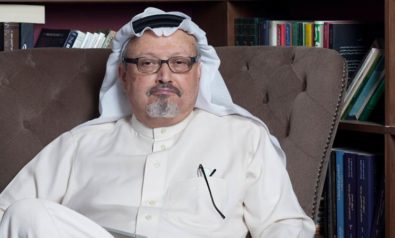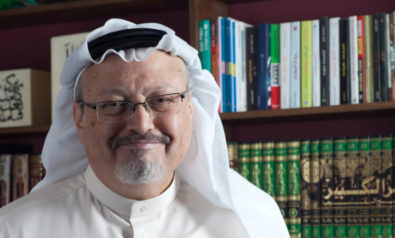The sudden selective indignation regarding the actions of the Saudi regime raises concerns about how the news media handles atrocities across the world.
The disappearance of journalist Jamal Khashoggi at the Saudi consulate in Istanbul has sparked a media frenzy in much of the world. The New York Times has published vast amounts of coverage examining in detail a host of angles, from the incident itself to the political and corporate fallout in the US and abroad, and even an opinion piece written by Khashoggi’s fiancée, Hatice Cengiz.
In total, the newspaper has devoted some 50,000 words (and counting) to the story in the two weeks since it broke. This is roughly equivalent to the quantity of coverage in the same newspaper for the previous four months of Saudi-related issues combined — and those four months were hardly uneventful. During that period, the Saudi regime launched a major offensive on the strategic port of Hodeidah in Yemen; bombed a civilian bus, killing 40 children and 11 adults; lifted a ban on driving for women; dramatically broke off relations with Canada over a tweet; put on hold the initial public offering for its massive oil company, Aramco; and called for the death penalty for a female activist, among other things. So what is it about the disappearance and possible murder of Jamal Khashoggi that has made it so particularly newsworthy?
Mixed Messages
The US media’s recent coverage of Saudi Arabia has been a combination of (apparently largely unfounded) optimism regarding political and social reform, cold strategic analysis of how the country fits in the region and its relationship with the US, and a rather matter-of-fact description of human rights abuses and potential war crimes.
A massive lobbying and public relations campaign by the regime has certainly helped promote a perception in the news that Saudi Arabia is liberalizing, and that the crown prince, Mohammed bin Salman, frequently referred to as MBS, is a reformer who deserves admiration. Coverage of the Saudi charm offensive seems to have been relatively positive, while to some it appears “fawning.” A 2017 opinion piece by Thomas Friedman in The New York Times announcing the arrival of a Saudi Arab Spring is a case in point. This was by no means the first time that the paper has suggested that change was coming to the kingdom.
This is not to say that the media has failed to report Saudi atrocities and human rights abuses. It is no secret, for example, that Saudi Arabia has led a devastating air and ground offensive in large swathes of Yemen, along with an even more devastating land, air and sea blockade that has contributed to huge numbers of deaths, a record one million cholera infections and has left three-quarters of the entire population in dire need of humanitarian aid, much of which cannot be delivered.
While all parties in the conflict share responsibility for the suffering, a UN report strongly suggests that war crimes have been committed and singles out the Saudi and Emirati actions as causing the greatest civilian casualties. Nor is it a secret that Saudi Arabia locks up, and at times publicly beheads, critics of the regime on highly suspect charges — or sometimes no charges at all. These stories have been covered by The New York Times and its colleagues, and they can certainly be critical.
But coverage has tended to be rather limited in quantity and often tame in tone when compared to atrocities committed elsewhere, not least in cases in which the perpetrator is a perceived “enemy” of the US government. Since his rise to de-facto power, MBS has careened from one foreign policy blunder to another — from the full-scale military intervention in Yemen to the blockade on Qatar and the apparent kidnapping of the Lebanese Prime Minister Saad Hariri and, finally, to the Khashoggi incident it currently faces. And yet the tendency in the media on the whole has been to gloss over this, which can perhaps best be explained by the narrative around MBS as a young, bold and dynamic reformer, and by the country’s status as a key US ally, buyer of weapons and provider of oil.
The Deal-Breaker
In 2017, when the kingdom held its first Future Investment Initiative, nicknamed Davos in the Desert, a CNN Business article had nothing but praise for the event and the future of the country. The trend continued as MBS visited the UK and the US accompanied by a supportive media, offering happy photo opportunities with a host of famous billionaires, including Jeff Bezos, owner of The Washington Post. The constant stream of atrocities in Yemen and horrific repression within Saudi Arabia were no impediment to this support — it was business as usual with the kingdom.
When the second Davos in the Desert event was planned for October 2018, The New York Times had committed itself as a media sponsor, and other media partners included CNN, the Financial Times and Bloomberg; the owner of The Los Angeles Times was scheduled to attend. All that abruptly changed in the wake of the disappearance of Jamal Khashoggi. Representatives of all of the aforementioned media corporations, along with a host of other current and potential investment partners, announced that they were no longer willing to take part in the event. CNN Business quoted a researcher at Chatham House calling the incident a deal-breaker for investors. The word applies equally to the news media and its dramatic change of heart in covering Saudi Arabia.
So why the change? Joseph Stalin allegedly once remarked that the death of one man is a tragedy, but the death of millions is a statistic. Millions of suffering, yet faceless Yemeni civilians are indeed all too often reduced to a statistic. On the other hand, Jamal Khashoggi was not just any ordinary individual. Since fleeing Saudi Arabia, he became a columnist with The Washington Post, was frequently interviewed by US and other media outlets, and was close to people in power both in the media and political circles. Surely, it hit close to home for the American media.
A Sudden Bout of Selective Indignation?
The shock and sensationalistic news value of what appears to be a gruesome murder mystery certainly has also played a role in the heavy coverage. Is Jamal Khashoggi alive or dead? Was he killed and then dismembered in the consulate? Where is his body? Then there is the cloak-and-dagger mystery of the so-called hit squad that flew in from Riyadh, the (unlikely) possibility that the murder was secretly recorded by the victim via his Apple Watch, or that the consulate was bugged by Turkish spies.
The Turkish authorities’ piecemeal leaking of information also kept interest high, including allegations that the Saudi team was carrying a bone saw, that there was torture and that there are recordings. The fact that so many unknowns remain after two weeks also serves to inflate the coverage. When US-made Saudi bombs were dropped on a bus killing 40 children, however, there was no mystery about it. The facts of the matter were quickly established, so there was little interest in pursuing the matter further.
What must not be lost in the pressure on Saudi Arabia is that the regime has disappeared/ detained hundreds, if not thousands of people, including women’s driving activist Loujain Al-Hathloul and economist Essam Al-Zamil. @JKhashoggi wrote to bring attention to this #khashoggi
— Karen Attiah (@KarenAttiah) October 16, 2018
The deliberate and brazen nature of the act (if proven true) also helps account for the indignation and resulting coverage. Bombings of hundreds of civilians can be explained away as a targeting accident of war, and even mass famine affecting millions of people can be portrayed as an unfortunate consequence of conflict and weather, for which blame can be spread around. A human rights activist beheaded in a public square can be labeled a terrorist or a drug dealer, if any explanation is required.
But the murder of a journalist, who was a known public figure in the US, at a consulate in a foreign country without taking the trouble to invent charges or hold a trial, is not something that can be simply explained away. Friedman, in response to the incident, writes that if the murder were indeed true, it “would be an unfathomable violation of norms of human decency, worse not in numbers but in principle than even the Yemen war.” This incredible feat of moral gymnastics tells us so much about the lens through which atrocities can be viewed by media agenda-setters.
Finally, media access has also meant that reporters can be on the ground and gather information. Journalists are rarely able to enter Saudi Arabia or Yemen, and although grainy images of public beheadings do emerge from time to time, they are usually lacking in terms of context, and follow-ups are rarely possible. In the case of Jamal Khashoggi’s disappearance, journalists have been able to set up cameras in front of the Saudi consulate in Istanbul — at times broadcasting live — and have been given access to a range of video clips associated with the incident, including footage of Khashoggi and his fiancée at the consulate, and the movements of the alleged hit squad.
Whatever the reasons, the sudden rise of selective indignation regarding the actions of the Saudi regime raises some serious concerns about how the news media handles atrocities throughout the world. The media’s response to the Khashoggi incident, both in terms of the quantity and content of coverage and its participation in events in Saudi Arabia, is clearly not of a straw that broke the camel’s back nature, but marks an abrupt turnaround. It should be examined and questioned.
The views expressed in this article are the author’s own and do not necessarily reflect Fair Observer’s editorial policy.
Support Fair Observer
We rely on your support for our independence, diversity and quality.
For more than 10 years, Fair Observer has been free, fair and independent. No billionaire owns us, no advertisers control us. We are a reader-supported nonprofit. Unlike many other publications, we keep our content free for readers regardless of where they live or whether they can afford to pay. We have no paywalls and no ads.
In the post-truth era of fake news, echo chambers and filter bubbles, we publish a plurality of perspectives from around the world. Anyone can publish with us, but everyone goes through a rigorous editorial process. So, you get fact-checked, well-reasoned content instead of noise.
We publish 2,500+ voices from 90+ countries. We also conduct education and training programs
on subjects ranging from digital media and journalism to writing and critical thinking. This
doesn’t come cheap. Servers, editors, trainers and web developers cost
money.
Please consider supporting us on a regular basis as a recurring donor or a
sustaining member.
Will you support FO’s journalism?
We rely on your support for our independence, diversity and quality.
















